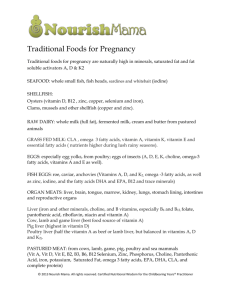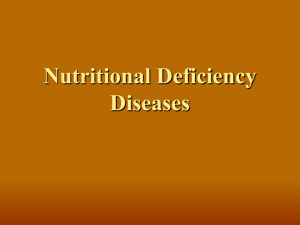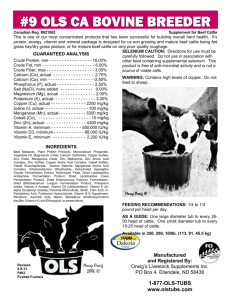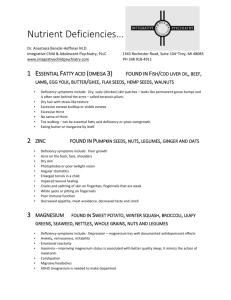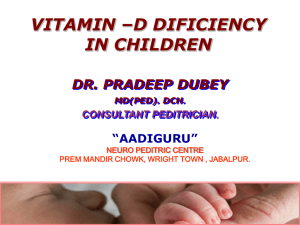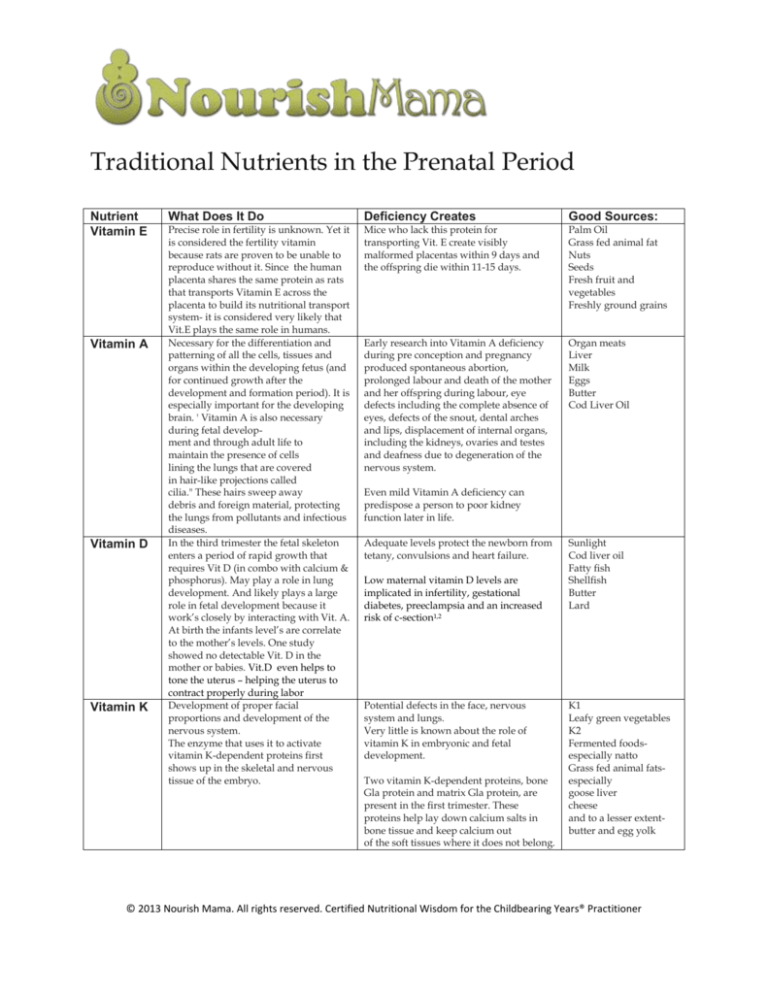
Traditional Nutrients in the Prenatal Period
Nutrient
Vitamin E
Vitamin A
Vitamin D
Vitamin K
What Does It Do
Deficiency Creates
Good Sources:
Precise role in fertility is unknown. Yet it
is considered the fertility vitamin
because rats are proven to be unable to
reproduce without it. Since the human
placenta shares the same protein as rats
that transports Vitamin E across the
placenta to build its nutritional transport
system- it is considered very likely that
Vit.E plays the same role in humans.
Necessary for the differentiation and
patterning of all the cells, tissues and
organs within the developing fetus (and
for continued growth after the
development and formation period). It is
especially important for the developing
brain. ' Vitamin A is also necessary
during fetal development and through adult life to
maintain the presence of cells
lining the lungs that are covered
in hair-like projections called
cilia." These hairs sweep away
debris and foreign material, protecting
the lungs from pollutants and infectious
diseases.
In the third trimester the fetal skeleton
enters a period of rapid growth that
requires Vit D (in combo with calcium &
phosphorus). May play a role in lung
development. And likely plays a large
role in fetal development because it
work’s closely by interacting with Vit. A.
At birth the infants level’s are correlate
to the mother’s levels. One study
showed no detectable Vit. D in the
mother or babies. Vit.D even helps to
tone the uterus – helping the uterus to
contract properly during labor
Development of proper facial
proportions and development of the
nervous system.
The enzyme that uses it to activate
vitamin K-dependent proteins first
shows up in the skeletal and nervous
tissue of the embryo.
Mice who lack this protein for
transporting Vit. E create visibly
malformed placentas within 9 days and
the offspring die within 11-15 days.
Palm Oil
Grass fed animal fat
Nuts
Seeds
Fresh fruit and
vegetables
Freshly ground grains
Early research into Vitamin A deficiency
during pre conception and pregnancy
produced spontaneous abortion,
prolonged labour and death of the mother
and her offspring during labour, eye
defects including the complete absence of
eyes, defects of the snout, dental arches
and lips, displacement of internal organs,
including the kidneys, ovaries and testes
and deafness due to degeneration of the
nervous system.
Organ meats
Liver
Milk
Eggs
Butter
Cod Liver Oil
Even mild Vitamin A deficiency can
predispose a person to poor kidney
function later in life.
Adequate levels protect the newborn from
tetany, convulsions and heart failure.
Low maternal vitamin D levels are
implicated in infertility, gestational
diabetes, preeclampsia and an increased
risk of c-section1,2
Potential defects in the face, nervous
system and lungs.
Very little is known about the role of
vitamin K in embryonic and fetal
development.
Two vitamin K-dependent proteins, bone
Gla protein and matrix Gla protein, are
present in the first trimester. These
proteins help lay down calcium salts in
bone tissue and keep calcium out
of the soft tissues where it does not belong.
Sunlight
Cod liver oil
Fatty fish
Shellfish
Butter
Lard
K1
Leafy green vegetables
K2
Fermented foodsespecially natto
Grass fed animal fatsespecially
goose liver
cheese
and to a lesser extentbutter and egg yolk
© 2013 Nourish Mama. All rights reserved. Certified Nutritional Wisdom for the Childbearing Years® Practitioner
Nutrient
DHA
Biotin
Folate
(absorption is
dependant on
zinc status)
Choline
Glycine
Zinc
What Does It Do
Deficiency Creates
Good Sources:
Formation of neurons synthesis of the
important brain lipid
phosphatidylserine: it is also the
precursor to an important compound
that protects neurons when they are
assaulted by oxidative stress. The fetus
hoards DHA from the mother and
incorporates it into its brain at 10
times the rate at which it can synthesize
it.
Critical for fetal growth and
development. Deficiency seems to
common in pregnant women. 13
Suboptimal brain and eye development.
Indeed low omega-3 levels are implicated
in male infertility as men suffering from
infertility suffer significantly lower levels
of omega-3 fatty acids in their sperm than
men of normal fertility2
Cod liver oil
Fatty Fish
Small amounts in
grassfed animals
Caviar
Intrauterine growth retardation 14, limb
and palate defects in rats.
Liver
egg yolks
Whole wheat bread
Cheese
Avocado
Salmon
Chicken
Pork
Artichoke
Raspberries
Necessary for the production of new
DNA and DNA is needed for new cells.
Need to expand blood supply in the
mother.
Increases birth weight.
Direct role in development of the brain.
The formation of the connections
between neurons, called synapses which
continue at a high rate through to the 4th
year of life.
Choline is particularly critical in tooth
development3
Indeed, a mother’s intake of choline
during pregnancy may improve the
capability for memory in her child4,5,
Limiting factor for protein synthesis in
the fetus so almost certainly a factor for
fetal growth.
The fetus can obtain it from the mother
or can synthesize it in the presence of
foliated and another amino acid serine.
Neural tube defects (defects of the brain
and spinal cord)
May prevent spontaneous abortion,
mental retardation.
Deformations of the mouth, face and heart.
Neural tube defects6
Maternal intake of choline might
significantly decrease cognitive
dysfunction seen in Downs Syndrome, at
least in mice7.
Liver
Legumes
Greens
Asparagus
Beets
Liver
Egg yolk
Grass fed dairy
To a lessor extent: meat,
crucifers, nuts and
legumes
Intrauterine growth retardation
Collagen rich foods
such as skin and bone
broth.
Consumption of the mineral zinc alone
as well as in combination with
antioxidants like vitamins C and E
shows promising results for men
suffering Zinc on its own or in
combination with vitamins C and E
improves sperm quality in infertile
men8.
For women, too, zinc is essential to
reproductive health and to the health of
infants developing in their wombs. In a
study of pregnant Canadian women,
those with the highest overall intake of
zinc were the least likely to suffer from
symptoms of depression12.
Glycine can be depleted with excess
methionine (another amino acid) high in
eggs and meat. Therefore a mother should
match her eggs and meat with skin and
bone broth, liver, legumes and greens.
Male infertility 9
Shellfish
Low maternal intake of zinc is associated
with asthmatic symptoms in children10.
Maternal zinc deficiency is also implicated
in birth defects, low birth weight,
intrauterine growth retardation, a
tendency toward high blood pressure,
behavioral problems, impaired immune
function and fetal death11.
© 2013 Nourish Mama. All rights reserved. Certified Nutritional Wisdom for the Childbearing Years® Practitioner
References
1. Barrett, et al. Vitamin D and pregnancy: An old problem revisited. Best Practices &
Research, Clinical Endocrinology & Metabolism. August 2010.
2. Lewis, et al. Vitamin D deficiency and pregnancy: from preconception to birth.
Molecular Nutrition & Research. August 2010
3. Nandasena, et al. Archives of Oral Biology. August 2010.
4. Zeisel, et al. Perinatal choline influences brain structure and function. Nutrition
Reviews. April 2006.
5. Zeisel. The fetal origins of memory: the role of dietary choline in optimal brain
development. Journal of Pediatrics. November 2006.
6. Zeisel. Choline: needed for normal development of memory. Journal of the American
College of Nutrition. October 2000.
7. Moon, et al. Perinatal choline supplementation improves cognitive functioning and
emotion regulation in the Ts65Dn mouse model of Down syndrome. Behavioral
Neuroscience. June 2010
8. Omu, et al. Indications of the mechanisms involved in improved sperm parameters
by zinc therapy. Medical Principles & Practice. 2008
9. Colager, et al. Zinc levels in seminal plasma are associated with sperm quality in
fertile and infertile men. Nutrition Research. February 2009.
10. De Luca, et al. Fetal and early postnatal life roots of asthma. Journal of maternal-fetal
neonatal medicine. October 2010.
11. Urlu-Adams, et al. Zinc and reproduction: effects of zinc deficiency on prenatal and
early postnatal development. Birth Defects Research. August 2010.
12. Roy, et al. Higher zinc intake buffers the impact of stress on depressive symptoms in
pregnancy. Nutrition Research. October 2010.
13.http://journals.lww.com/nutritiontodayonline/Abstract/2012/03000/Biotin___Crit
ical_for_Fetal_Growth_and_Development.10.aspx
14. http://www.ncbi.nlm.nih.gov/pubmed/4059664
15. Masterjohn Chris, Vitamins for Fetal Development, Wise Traditions, Healthy Baby
Issue
© 2013 Nourish Mama. All rights reserved. Certified Nutritional Wisdom for the Childbearing Years® Practitioner

